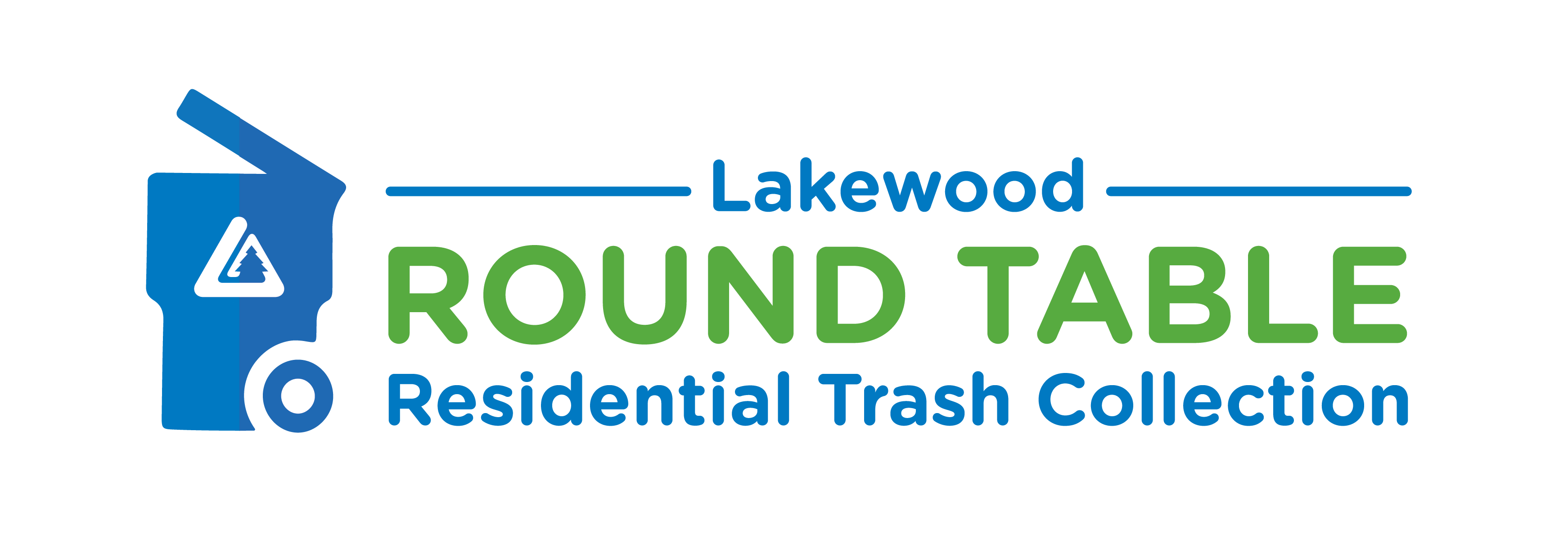Join the Round Table!
Consultation has concluded
Consultation has concluded.

UPDATE! City Council will consider at its Aug. 26 meeting a question on the November ballot about whether the city should contract with companies for waste collection in Lakewood. Learn more about about this next step.
If you have questions, please ask it in the “Ask Us!” section or email us at sustainability@lakewood.org.

Consultation has concluded.

UPDATE! City Council will consider at its Aug. 26 meeting a question on the November ballot about whether the city should contract with companies for waste collection in Lakewood. Learn more about about this next step.
If you have questions, please ask it in the “Ask Us!” section or email us at sustainability@lakewood.org.

-
What are Lakewood's community goals for trash and recycling?
Share What are Lakewood's community goals for trash and recycling? on Facebook Share What are Lakewood's community goals for trash and recycling? on Twitter Share What are Lakewood's community goals for trash and recycling? on Linkedin Email What are Lakewood's community goals for trash and recycling? linkCLOSED: We are analyzing all of your comments now! If you have additional comments, please email sustainability@lakewood.org.
Quick Summary
Did you know Lakewood has adopted goals to reduce its greenhouse gas emissions, divert waste from the landfill, and make household costs affordable? The Lakewood Sustainability Plan and Comprehensive Plan include strategies to achieve these goals. Take a look in the Deep Dive section to learn about how the plans were developed and how we plan to achieve our community goals.Deep Dive
How was the plan developed?The planning process for the Sustainability Plan began in the fall of 2013, involving eight open houses, 87 work group participants, and over 450 volunteer hours from Lakewood community members. Six work groups were organized to address a wide range of sustainability topics, including zero waste. City staff, community members, and industry professionals joined residents in each work group to discuss existing challenges and collaborate on goals, objectives, targets, and strategies that would eventually become the Sustainability Plan.
Zero Waste Goals and Objectives:- Minimize Lakewood’s communitywide greenhouse gas emissions and prepare and adapt to ongoing climate change impacts (p. 26).
- Make household costs affordable and accessible for Lakewood residents (p.64).
- Create a culture of zero waste in Lakewood through education, municipal operations, infrastructure, and services (p. 74).
- Foster sustainable household waste management (p. 82).
Zero Waste Targets:- Reduce communitywide greenhouse gas emissions by 20 percent below 2007 levels by 2025 (p. 26).
- Reduce communitywide greenhouse gas emissions by 50 percent below 2007 levels by 2050 (p. 26).
- Achieve a 60 percent communitywide diversion rate by 2025 (p. 74).
- Achieve a 60 percent residential (single-family residences and complexes with eight units or fewer) diversion rate by 2025 (p. 82).
How was the plan developed?The planning process for the recently updated Comprehensive Plan began in the fall of 2013 and involved eight open houses and the formation of a Comprehensive Plan Advisory Committee toprovide guidance andfeedback to staff on the vision, guiding principles, goals, and action steps.Zero Waste Goals:- Promote clean and safe neighborhoods (p. 4-14).
- Improve air quality and reduce greenhouse gas (GHG) emissions by working toward compliance with state and local air quality standards (p.7-8).
- Decrease the amount of waste generated (p. 7-16).
- Increase recycling, composting, and municipal solid waste disposal education (p. 7-17).
- Increase waste diversion rates (p. 7-17).
 1 comment
1 comment
-
How do Lakewood prices compare to other Colorado communities?
Share How do Lakewood prices compare to other Colorado communities? on Facebook Share How do Lakewood prices compare to other Colorado communities? on Twitter Share How do Lakewood prices compare to other Colorado communities? on Linkedin Email How do Lakewood prices compare to other Colorado communities? linkCLOSED: We are analyzing all of your comments now! If you have additional comments, please email sustainability@lakewood.org.
Quick Summary
Trash collection costs relate directly to transportation expenses. The more efficient a collection route, the less fuel and maintenance are required, resulting in lower costs for the hauler, that can be passed along to the customer. In Lakewood, Arvada, Fort Collins and several other Colorado communities, haulers operate in an open system, with customers across the city. In other communities, haulers are responsible for a specific area, which allows the hauler to schedule the most efficient routes possible, resulting in lower costs. Take a look in the Deep Dive section to see how rates in Colorado communities compare.
Deep Dive
Average Lakewood Monthly Prices open subscription system*
- Non-HOA Household, trash without recycling: $15-20
- Non-HOA Household, trash with recycling: $20-25
- HOA Household, trash with recycling: $8-10
Golden Monthly Prices organized collection system**
- Household, small trash (32 gallon) with recycling: $7.50
- Household, large trash (96 gallon) with recycling: $19.25
- Household, small trash (32 gallon) with recycling and compost: $16.95
- Household, large trash (96 gallon) with recycling and compost: $28.70
Denver Monthly Prices municipal system***
- Household, trash with recycling: free (provided through General Fund from sales and property taxes)
- Household, trash with recycling and compost: $10
Edgewater Monthly Prices organized collection system****
- Household, small trash (32 gallon) with recycling: $10
- Household, large trash (96 gallon) with recycling: $20
Fort Collins Monthly Prices open subscription system****
- Household, small trash (30 gallon) with recycling: $13
- Household, large trash (90 gallon) with recycling: $39
- Household, small trash (30 gallon) with recycling and compost: $26
- Household, large trash (90 gallon) with recycling and compost: $52
*According to a 2016 City of Lakewood, CO Trash and Recycling Survey
**According to City of Golden website
***According to City and County of Denver website
****According to a 2016 Report by Skumatz Economic Research Associates, Inc.
-
How is trash and recycling collected in Lakewood?
Share How is trash and recycling collected in Lakewood? on Facebook Share How is trash and recycling collected in Lakewood? on Twitter Share How is trash and recycling collected in Lakewood? on Linkedin Email How is trash and recycling collected in Lakewood? linkCLOSED: We are analyzing all of your comments now! If you have additional comments, please email sustainability@lakewood.org.
Quick Summary
Single-family home and town home owners, and homeowner associations (HOAs) in Lakewood sign up for trash collection services through any of the private companies that are licensed to collect trash in Lakewood. The City requires haulers to license annually, but does not regulate services, scheduling, or costs.Deep Dive
The City of Lakewood has an open subscription system, which means homeowners must contract with haulers individually. Property owners or HOAs may sign up with any licensed hauler.In order to operate in Lakewood, haulers are required to license with the City, which includes a short application, an annual fee, insurance requirements, hours of operation, and compliance with state and federal disposal regulations.What type of properties are we talking about here?
This Round Table discussion is addressing trash collection services for single-family homes and town homes. Commercial and multifamily properties have distinctions, including state law requirements, property management considerations, and other elements that require a separate discussion.By the Numbers- 26 haulers are currently licensed in Lakewood
- 11 of those 26 haulers provide curbside residential trash and recycling services
- Approximately 45,000 Lakewood homes use this system
- 27 percent of residents are part of homeowners associations (HOAs) that organize collection services
-
How do other cities' trash collection systems work?
Share How do other cities' trash collection systems work? on Facebook Share How do other cities' trash collection systems work? on Twitter Share How do other cities' trash collection systems work? on Linkedin Email How do other cities' trash collection systems work? linkCLOSED: We are analyzing all of your comments now! If you have additional comments, please email sustainability@lakewood.org.
Quick Summary
Communities approach residential trash collection in one of three main ways: 1) Open subscription, which means homes must contract with haulers individually; 2) Organized collection, in which the city contracts with one or more haulers, and residents are assigned to a hauler based on their address; and 3) municipalization, in which the city operates trash collection services. Take a look in the Deep Dive section to learn more about the pros and cons of each.Deep Dive
Communities across the country have approached residential trash and recycling collection (and even curbside compost collection) in one of three main ways:1. Open subscription: Haulers compete for accounts, and residents contract directly with any licensed hauler. Examples: Lakewood, Westminster, Arvada- Pros: Customer is free to choose their hauler based on preference; direct relationship between hauler and customer; minimal administrative involvement by the city; easier market entry for new, small businesses.
- Cons: Typically higher cost; increased truck traffic resulting in air pollution, noise, and road impacts; potentially inconsistent price for the same level of service.
2. Organized collection: The city conducts a competitive procurement process in which contracted haulers operate in a specific geographical area (district or city boundary), and residents are assigned a hauler based on their address. Examples: Golden, Lafayette, Edgewater- Pros: Increased efficiency may result in lower customer cost; decreased truck traffic resulting in reduced noise, air pollution, and road impacts; standardized safe practices; consistency in price and service to customers.
- Cons: Customer choice is limited or eliminated; increased administrative involvement by the city.
3. Municipalization: The city operates hauling services. Examples: Denver, Thornton, Northglenn- Pros: Increased efficiency may result in lower customer cost; decreased truck traffic resulting in reduced noise, air pollution, and road impacts; standardized safe practices; consistency in price and service to customers.
- Cons: Significant costs for equipment, staffing, and management for the city; Customer choice is limited or eliminated.
What are the goals of this project?
- Understand residents' opinions about Lakewood's current residential trash collection system for single-family homes and town homes.
- Collect ideas on how the system could be improved.
- Provide a summary of community concerns, opinions, and ideas and provide recommendations for improving the residential waste collection system.
What is the status of this project?
- Attended 21 events
- Had face-to-face conversations with more than 500 folks
- Reached more than 20,000 through social media
- Received more than 160 postcard surveys
- Received more than 600 online surveys and comments
- Attracted more than 3,700 visitors to this project website
- Engaged with more than 290 visitors through this project website
Project Timeline
-
2016-2017
Join the Round Table! has finished this stageCollect data on existing conditions and best practices in other cities.
-
Summer 2018
Join the Round Table! has finished this stageGather residents’ input through online platforms and in-person discussions.
-
Winter 2018/2019
Join the Round Table! has finished this stageCompile residents’ comments and concerns to create a comprehensive report for City Council.
-
Feb. 4, 2019
Join the Round Table! has finished this stagePresent comprehensive report to City Council.
-
May 2019
Join the Round Table! has finished this stageConduct additional research that involves receiving detailed information from waste haulers.
-
July 15, 2019
Join the Round Table! is currently at this stagePresent waste haulers’ information for City Council to determine next steps.
Printable Materials
-
 2019 Analysis of Residential Waste Collection Improvement Options (550 KB) (pdf)
2019 Analysis of Residential Waste Collection Improvement Options (550 KB) (pdf)
-
 RFP Document (346 KB) (pdf)
RFP Document (346 KB) (pdf)
-
 RFP Key Components (119 KB) (pdf)
RFP Key Components (119 KB) (pdf)
-
 2019 Lakewood Residential Trash Collection Report 1.28.19 (3.38 MB) (pdf)
2019 Lakewood Residential Trash Collection Report 1.28.19 (3.38 MB) (pdf)
-
 Common Issues (24.2 KB) (pdf)
Common Issues (24.2 KB) (pdf)
-
 Other Cities' Services and Prices (32.3 KB) (pdf)
Other Cities' Services and Prices (32.3 KB) (pdf)
-
 Trash Collection System Elements (48.5 KB) (pdf)
Trash Collection System Elements (48.5 KB) (pdf)
Who's listening
-

Email jonwac@lakewood.org


 1 comment
1 comment

